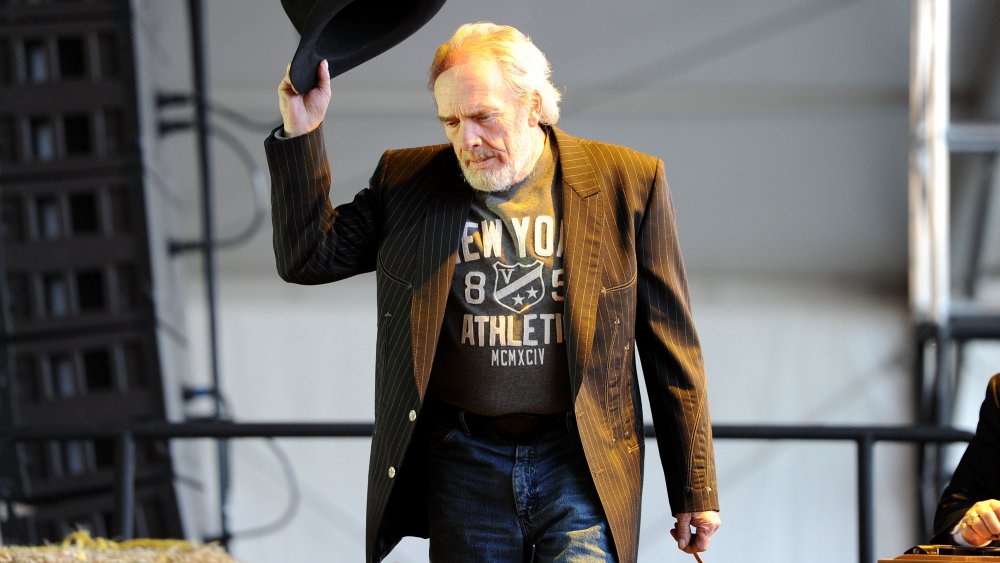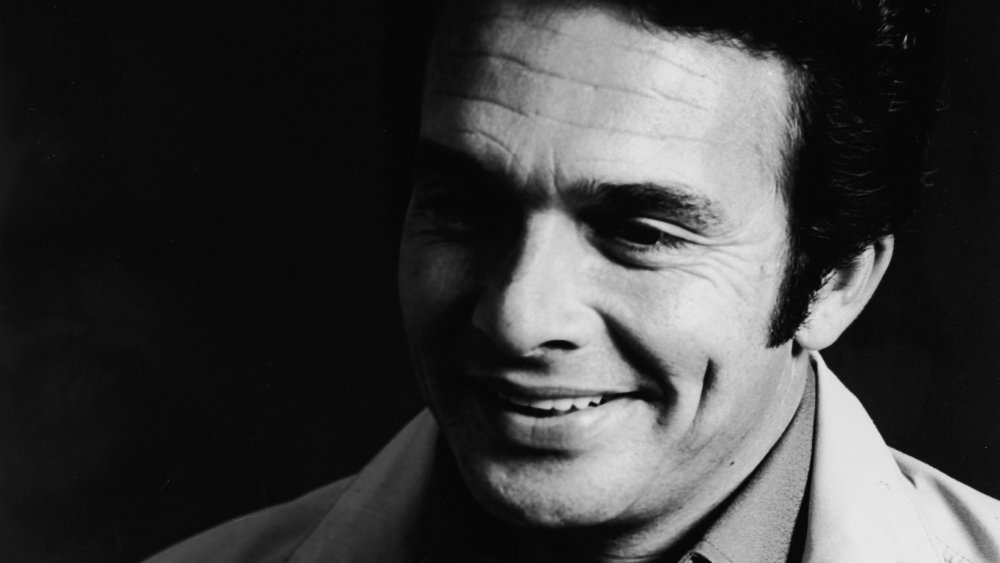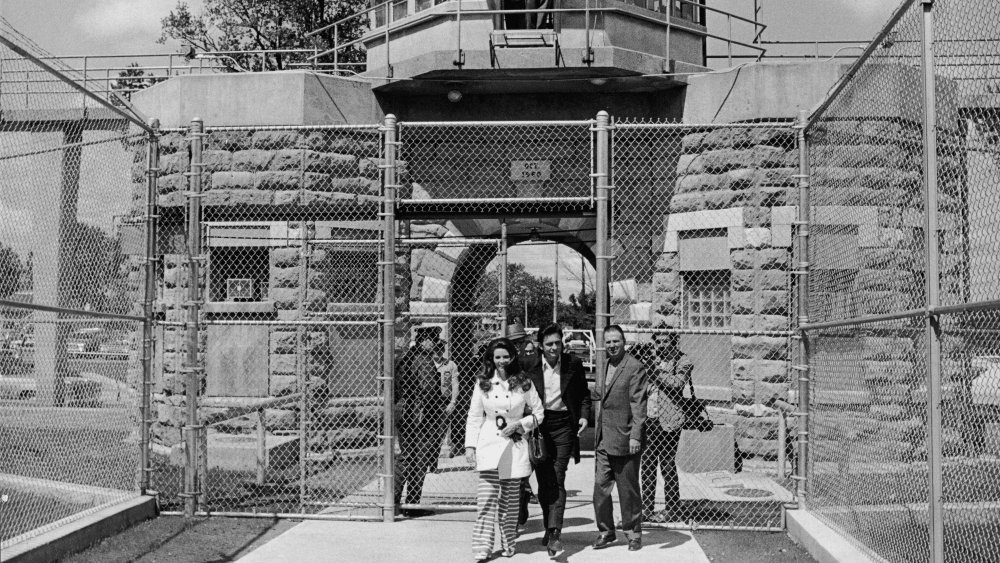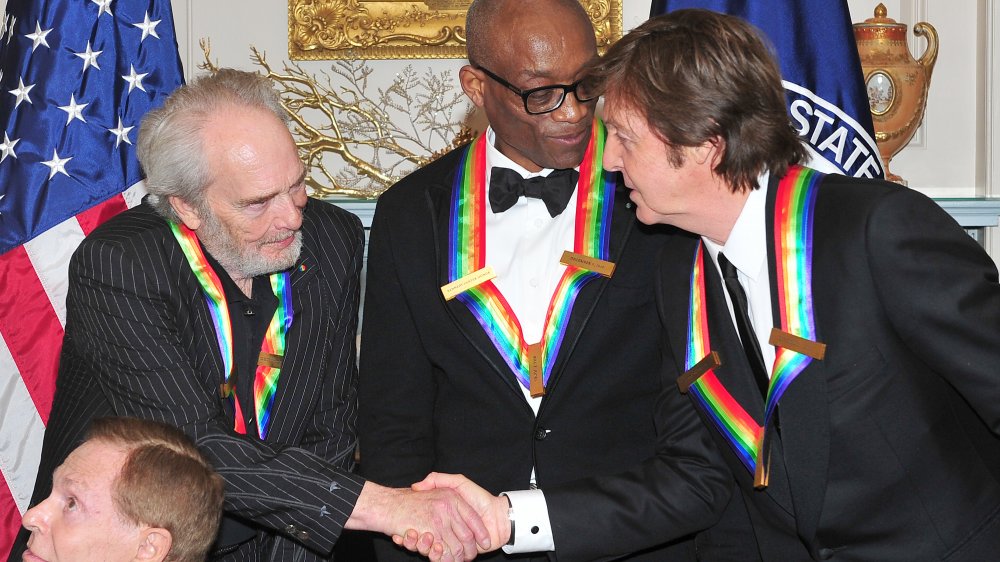The Truth Behind Merle Haggard's Time In Prison
"Contemporary" is a relative thing. Is Merle Haggard emblematic — iconic, even — of contemporary country music? Or classic? Outlaw? The Country Music Hall of Fame points out that Haggard was more honky-tonk than Nashville, but whatever niche you try to put Haggard in, odds are that he would break out of it eventually.
His youth really does sound like a country song, though. He was raised in a family that moved to California during the Great Depression, lived there in a converted boxcar, and had a father who worked for the railroads, but died when Merle was just eight years old. Four years later, the music bug started to nibble at Haggard, when his older brother, Lowell, passed along his used guitar to Merle, according to Rolling Stone, and Merle learned to play the instrument quickly. Despite this burgeoning talent, the primary reason that the death of Merle's father is generally considered one of the major turning points in Haggard's life is that, afterward, he basically turned into a juvenile delinquent: In and out of detention facilities, running away from home, hitchhiking cross-country, and hopping freight trains.
Merle Haggard pioneered the "Bakersfield Sound"
According to History, Merle Haggard's mother referred to him as "incorrigible." It was an apt description. In 1957, he pushed his luck a little too far with a robbery attempt. At the age of eighteen, Haggard soon found himself in California's San Quentin Prison, a maximum security penal institution not far from San Francisco.
By this time, Haggard had such a reputation for escape attempts that he wasn't allowed out of his cell past 4 P.M, according to a 2013 interview with Dan Rather. He planned to escape from San Quentin, too, but he was talked out of it by fellow prisoners, particularly after his cellmate made a break, shot a police officer, and was returned to prison for execution. Haggard met another death row inmate during a stint in solitary confinement, and these two incidents put something like the fear of God in Haggard. He buckled down, stopped thinking of escape, and according to NPR, became a steady worker in the prison's textile plant.
Merle Haggard's reform was inspired by a visit from Johnny Cash
A pivotal moment in Haggard's life, according to the Washington Post, was a 1959 performance at San Quentin by Johnny Cash. Cash is perhaps most often associated with Folsom Prison, since that title inspired his huge 1956 hit "Folsom Prison Blues" and provided a venue for a prison concert for the ages in 1968. Sliding back ten years earlier, though, History reports that Cash did his first prison concert at San Quentin, with a 20-year-old Merle Haggard as one of the inmates in the audience.
That concert, with Cash's performance, has often been credited with inspiring Haggard to focus on music. Haggard later said of Cash, "He had the right attitude. He chewed gum, looked arrogant and flipped the bird to the guards — he did everything the prisoners wanted to do. He was a mean mother from the South who was there because he loved us. When he walked away, everyone in that place had become a Johnny Cash fan."
Soon afterward, Haggard joined the prison's country music band, and started to hone his songwriting and performing skills. Haggard was paroled in 1960 after serving two years of his sentence. Years later, in 1972, he was granted an unconditional pardon from Ronald Reagan, then-governor of California, according to Rolling Stone.
In his later years, Merle Haggard received honors and accolades
After prison, Merle Haggard pursued a career in music, and continued writing, performing, and influencing the industry until his last days. Billboard says he scored 38 #1 hits before he was done, and is often considered a primary architect of what came to be known as the "Bakersfield Sound" genre of Country music — less polished, more gutsy, more honky-tonk, compared to the slicker iterations of country that were ruling the airwaves and the performance venues up to that time. Haggard, alongside such artists as Waylon Jennings, Kris Kristofferson, Willie Nelson, and his influential friend Johnny Case, were later considered to be pioneers in the "outlaw" subgenre of country music.
In 2010, Haggard became a Kennedy Center honoree alongside Sir Paul McCartney, according to Billboard. He also won a Grammy Lifetime Achievement Award, and inductions into both the Nashville Songwriters Hall of Fame and the Country Music Hall of Fame. Bob Dylan called him "herculean," according to Rolling Stone, while Willie Nelson considered him "one of the best." Not bad for an ex-con. Sadly, after a bout with double pneumonia, Haggard died on his 79th birthday, April 6, 2016.



